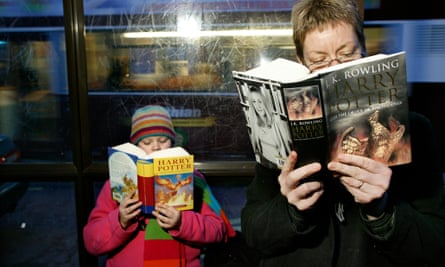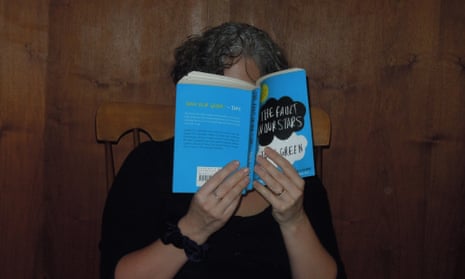It’s not a secret that books written for children, teens and young adults (YAs) often sell far more copies than even the most popular adult reads. Although a relatively new market, having only really fully developed over the past 50 years, the children’s book industry has grown astronomically to become worth millions of pounds worldwide, with authors such as JK Rowling, Suzanne Collins, Michael Morpurgo, John Green, and Jacqueline Wilson quickly becoming household favourites.
Perhaps one of the most important things to note about the teen and YA market in particular, though, is that the majority of its readers (55%, according to a 2012 study) are actually adults. Yes, you read that right: adults.
Once upon a time it would have been shameful for adults to read books written for teenagers, never mind admitting that publicly, but nowadays it has become so common that many have even taken to blogging to discuss and review what they have read. At YA events such as book signings and author talks, a staggering number of attendees are aged 18 or over – showing that the prior societal damnation of adults reading books for young people is no more.
Perhaps the real mystery, then, is not why the works of the authors above have been so successful commercially (it’s because they’re amazing books), but why they, and other books like them, have appealed to so many people beyond their target audience. This in itself creates a sub-mystery, too: why do these books remain popular years after they are first published, and what is it about our current society and world that means that their messages and values are still applicable to us?
A dominant part of any book’s success is its escapist appeal, and YA excels at providing this. The fantastical worlds and sheer inventiveness and imagination of YA is rarely rivalled by adult literature, though George RR Martin’s A Song of Ice and Fire series (also enjoyed by many teens) is an obvious exception.
The Chronicles of Narnia is a series that has been used for escapism for decades; Prince Caspian, published in 1951 but set during the second world war, is a particularly good example of a children’s book that serves an escapist purpose, as everything in the novel can be read as both symbolic of the second world war and also of Christianity.
The world which Lewis created is a very convincing and intricate analogy in which you can become lost, and the symbolism rife throughout allowed children at the time to understand the nature of what had happened while not explicitly telling them about it.
Nowadays the Narnian world is still a safe haven for people to escape into away from the stressful nature of modern life, as though it is very different to what we know and recognise, we still live in a world as dominated by conflict (such as that in Syria and Ukraine) and discrimination.
The worlds in books such as these continue to help distract us all from the horrors of the real world, while also enabling us to confront it in a safe medium – something adults clearly feel the need for as well as children.
Equally, YA books are great for evoking nostalgia; they can often remind older readers of their childhoods and teenage years , making them a comforting presence for those who just refuse to grow up and embrace their boring, often excitement-free adult lives. Society nowadays is so intricately and overwhelmingly critical of YA, and yet it is its simplicity that often provides the most pleasure for young people and adults alike.
Never forgetting perhaps the most essential part of the secret appeal of YA books: their universal applicability. New generations of young people are constantly growing up, and they are often found reading the same books as their predecessors due to the sheer quality and sense of purpose behind the writing, making them applicable to anyone, at any time.

The Harry Potter series is one of the most obvious examples of this standard of writing. It discusses important themes such as love, friendship, identity and discrimination, exhibits in-depth character development across the seven books (which in particular does appeal to young people as they can “grow” and age at the same time as Harry, Ron and Hermione) and utilises a simplistic writing style that can be enjoyed and interpreted by anyone regardless of age, sex, ethnicity, gender identity or sexual orientation (etc).
The best series are those which evolve as its readers develop – and Harry Potter is an excellent and timeless example of this, gradually becoming darker and more sirius (I’m so funny…) as the story progresses. It can potentially be argued that Harry Potter is the cause of YA’s popularity now: it was the first “big” series to hit the shelves, that society branded “mandatory” reading as one of the greatest series of our time.

As a teenager who just turned 18, I completely understand the widespread appeal of YA books, and I support any and all fellow adults reading them. Beyond everything I’ve already mentioned, I know that turning 18 (and thus legally becoming an adult) changes very little, and in particular it changes literally nothing about your reading preferences. You don’t automatically begin loving classics, and you don’t start gravitating helplessly towards the general fiction section of bookstores – you just continue buying what you know you’ll like to read. I continue to like the same genres of books, and the same authors, and I won’t just stop reading them now just because of how old I’m becoming.
This is the note on which I wish to leave you: adults are just people too, and we are entitled to read and like YA as much as anyone!
Do you think it’s great that teen and YA books are read by everybody? Share your thoughts on email childrens.books@theguardian.com or on Twitter @GdnChildrensBks.
Is there a books topic you’re just burning to write about? Join the Children’s Books site and you could do just that!
Your thoughts
@GdnChildrensBks Because the stories are better. Less long winded and more exciting.
— Beth Webb (@bethwebbauthor) February 24, 2015
Sherry, via email
I’m just glad people read. I know many adults that don’t read books. Books are window to the imagination.
@GuardianBooks @GdnChildrensBks I wish I knew!
— Yioryia (@LilliumLoves) February 24, 2015
Billie, via email
I can’t believe you left out a major reason my friends and I read YA. It’s because it’s clean. As more and more adult books push the envelope into what we feel is either gross, unnecessary violent, or pornographic, YA has largely remain a safe bastion of high-quality PG-13 entertainment.
@GuardianBooks @GdnChildrensBks Escapism. It's easier to pretend you're young with everything ahead of you.
— Susan McPhail (@be_anolderwoman) February 24, 2015
Justine, via email
As someone who has read Harry Potter, The Hunger Games, The Twilight Series and the Chronicles of Narnia as an adult, I’m thrilled to know I’m not alone. I don’t think there’s a problem with adults reading any of the above. Those books are for all ages, although I see the need for a YA classification simply so that the YA demographic has books that are age appropriate for them, although I don’t see a problem with kids in the YA category also reading the likes of Clive Barker, Stephen King and Anne Rice. I also think it’s probably good for the authors that their books are crossing over into the adult demo.
@GdnChildrensBks Great article. I read YA and children's books occasionally for nostalgia, escapism and for an easy read
— PatrickGeorge (@PatrickGeorge2) February 24, 2015
Anissa, via email
I enjoy reading youth fiction too. I find that contemporary fiction targeted at adults often lacks a well-structured plot and is instead peppered with “instant gratification” components, the most common being extreme violence. Teen and YA fiction need to keep their readers hooked in other ways than waiting for the next adrenaline-triggering gore-fest (Dan Brown and Stieg Larsson prose are an example of the latest).
@GuardianBooks @GdnChildrensBks because sometimes they're written by adults, who just make sense! @hotpatooties for example #teamgoose
— Emma (@erazy) February 24, 2015
Michelle, via email
I am 43 and the majority of the books I read are YA. I love the pace and youthfulness of it all.
@GuardianBooks @GdnChildrensBks a rest/break for the brain?
— Yadda (@yaddabristol) February 24, 2015
@GdnChildrensBks It's the name. "Young adult" is more appealing than "Teenie love/adventure/whatever story".
— superannoula (@superannoula) February 24, 2015
@GuardianBooks @GdnChildrensBks Because YA is about conflicts and identity and friendship and fear - and adults deal with those too.
— Maggie Harcourt (@maggieharcourt) February 24, 2015
